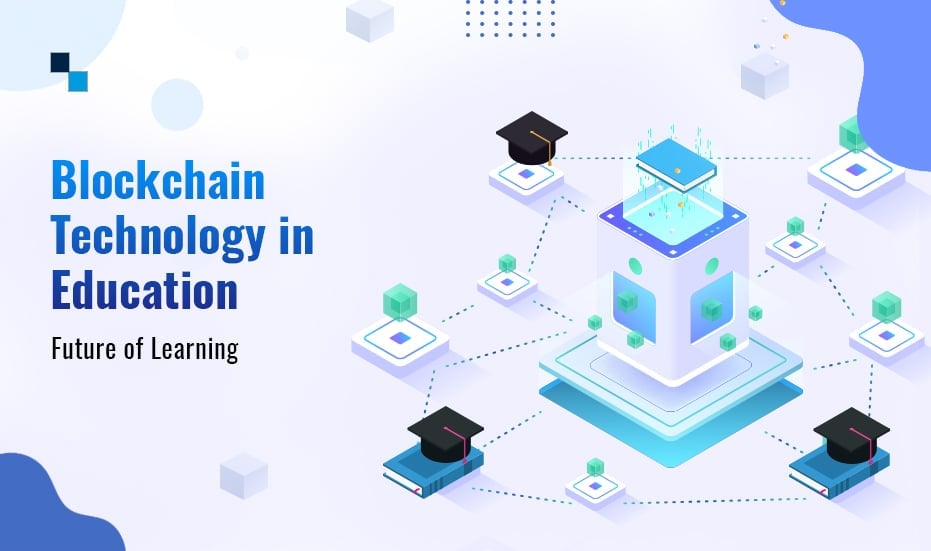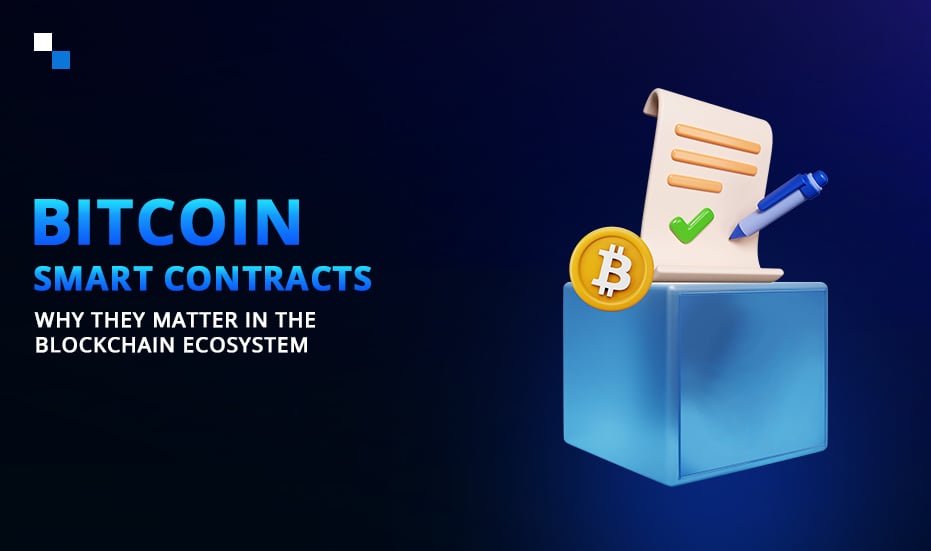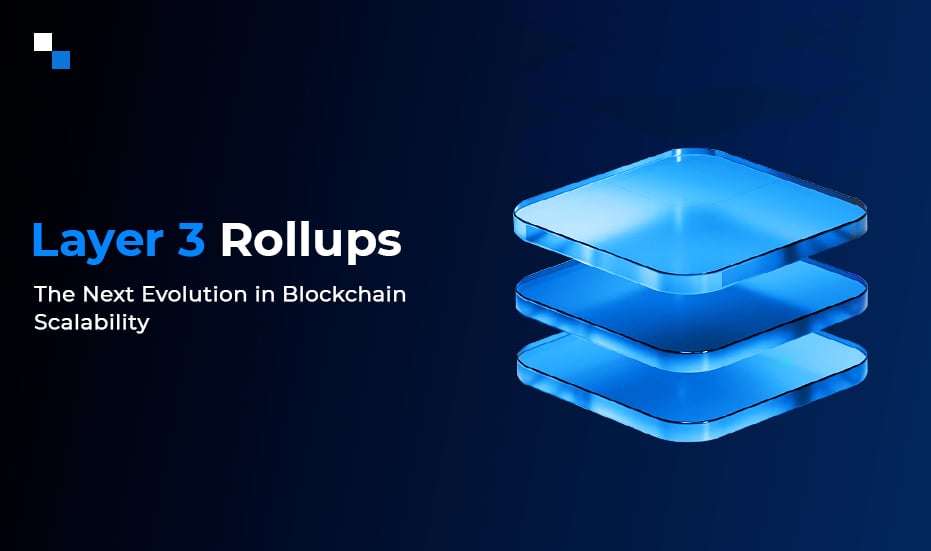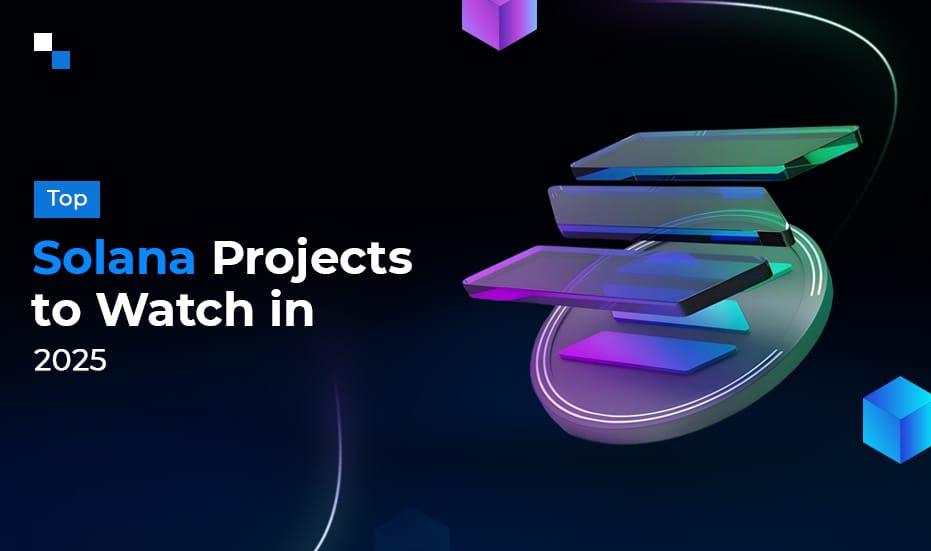
Tokenized Real-World Assets (RWAs): Expanding DeFi’s Reach on a Global Scale
June 19, 2023
Decoding the Price: Token Development Expenses on the Polygon Network
June 20, 2023The education sector has undergone several tremendous changes. From traditional classrooms to digital learning, this industry has encountered extensive growth, especially after the COVID-19 pandemic. The trend of e-learning has escalated during the COVID-19 pandemic and accelerated a new wave of revolution in the sector. Besides the introduction of the eLearning system, the education sector also experienced significant growth with Blockchain adoption.
Blockchain technology is considered a digital economy phenomenon and is also poised to transform the education industry. The technology has the potential to give a new direction to the sector by revamping the way the academic data is managed and students and teachers interact with each other.
Although Blockchain has not disrupted the education sector completely, its impact can be experienced in the coming years. According to Business Research Insights in 2021, the global Blockchain technology in education market size was valued at $118.73 million in 2021 and is expected to reach $1055.98 million by 2027, expanding at a CAGR of 43.94% during the forecast period. Many education institutions are planning to integrate the Blockchain into their existing system for increased transparency, streamlined processes, and easy record management.
Those looking for well-researched resources to understand the importance of Blockchain in education use cases, top edtech players in the sector, and information surrounding the concept have come to the right place.
This comprehensive guide covers several prominent aspects surrounding Blockchain development for education:
Prominent Blockchain in Education Use Cases
Blockchain is empowering students, institutions, and employers in numerous ways. The following Blockchain in education use cases will shed light on it.
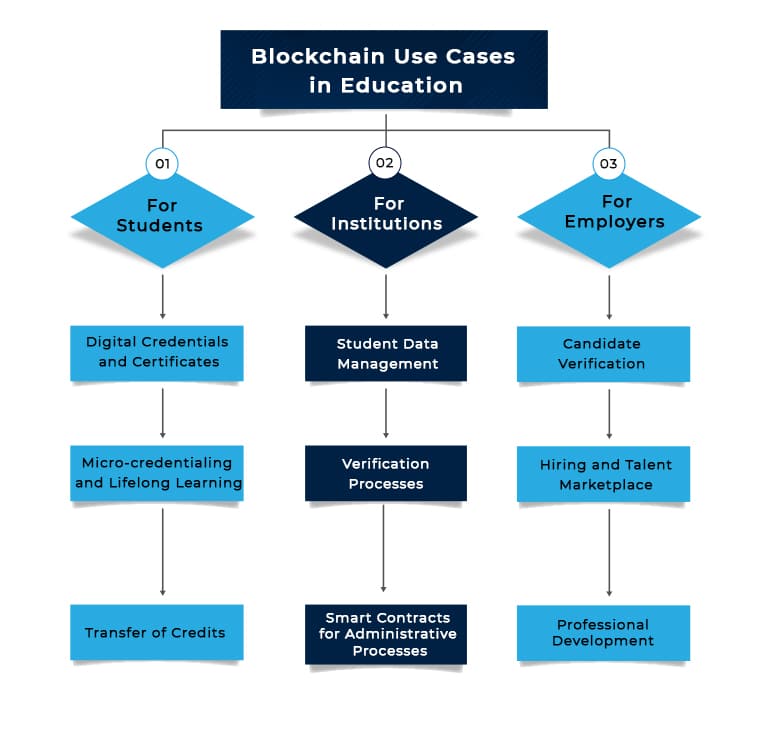
For Students:
- Digital Credentials and Certificates
Traditional paper-based certificates are prone to security risks, fraud, loss, or damage. The transformative Blockchain technology in education enables the creation and verification of digital credentials, such as degrees, diplomas, and certifications. These credentials are stored securely on the Blockchain, which ensures their integrity and makes it easier for students to share their achievements with employers or educational institutions.
- Micro-credentialing and Lifelong Learning
Blockchain application in education also allows students to earn micro-credentials for completing specific courses or acquiring specific skills. The micro-credentials stored on the Blockchain give freedom to students to create a comprehensive, immutable record of their skills and knowledge. This promotes lifelong learning and provides a more granular representation of a student’s abilities, beyond traditional degrees.
- Transfer of Credits
Blockchain technology in education enables a transparent and tamper-proof transfer of academic credits between institutions, which eliminates the need for manual verification and reduces bureaucracy. Such a level of transparency makes it easier for students to transfer between schools or universities without losing credit for completed coursework.
For Institutions:
- Student Data Management
Educational institutions handle vast amounts of sensitive student data. Blockchain development for education helps store this data with a promise of security and privacy. The data of Blockchain is encrypted and distributed across multiple nodes, making it a reliable and secure technology for student data management. It reduces the risk of data breaches and unauthorized access while giving students more control over their personal information.
- Verification Processes
The process of academic credentials verification, such as degrees or transcripts, can be time-consuming and costly. Blockchain-powered verification systems provide a decentralized and automated solution. Instead of contacting multiple institutions for verification, employers or other institutions can securely access and verify credentials directly from the Blockchain, saving time and effort.
- Smart Contracts for Administrative Processes
Smart contracts, self-executing contracts with predefined rules and conditions, can help streamline administrative processes in educational institutions. For example, smart contracts can automate processes like student enrollment, fee payments, and grade calculations. It reduces manual errors, improves efficiency, and ensures transparent execution of administrative tasks.
For Employers:
- Candidate Verification
The traditional method of candidate’s educational credentials verification is time-consuming and unreliable at the same time. Blockchain in education use cases helps in the seamless candidate verification and selection process. Blockchain-based verification platforms can provide employers with access to verified and tamper-proof records of a candidate’s educational achievements and professional history. This improves the hiring process, reduces the risk of fraudulent resumes, and saves employers valuable time.
- Hiring and Talent Marketplace
Blockchain application in education creates decentralized talent marketplaces, where job seekers can showcase their skills, certifications, and work history. Employers can use these platforms in order to look for candidates based on specific skills or qualifications, creating a more efficient and targeted hiring process. Such platforms promote meritocracy and provide individuals with alternative paths to showcase their abilities beyond traditional degrees.
- Professional Development
Blockchain development for education can facilitate continuous professional development by offering verified courses, training programs, or micro-credentials. Employers can incentivize their employees to acquire new skills or enhance existing ones by rewarding them with digital tokens or badges, which can be stored on the Blockchain. This promotes a culture of lifelong learning and upskilling within organizations.

Top EdTech Unicorns Utilizing Blockchain Application in Education
The following are some leading players in the education sector utilizing the power of Blockchain.
- BitDegree
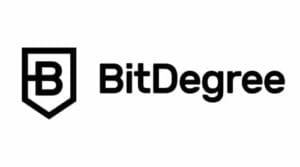 Founded: 2017
Founded: 2017
Location: Remote
BitDegree is a leading name among the EdTech unicorns that combines Blockchain ledgers and tokenization on its online education platform to transform the learning experience of students or learners. One can avail of both paid & free online courses on a number of topics, such as cryptocurrencies, Blockchain development for education, and gamified coding. BitDegree incentivizes learning by offering tokenized scholarships for successful course completion.
2. Parchment
 Founded: 2003
Founded: 2003
Location: Scottsdale, Arizona
Parchment is another leading player in the education sector that offers digital credential services to students, academic institutions, and employers. K-12 educators use the company’s Blockchain to upload any important developmental progress, whereas other higher education institutions use the platform to review academic merit, process applications, and produce immutable diplomas. Additionally, students also get access to educational information and have the freedom to share academic achievements with future employers.
3. Sony Global Education
 Founded: 2015
Founded: 2015
Location: Fully Remote
Sony Global Education partnered with IBM to develop a platform backed by Blockchain technology in education. The platform allows multiple institutions to add academic achievements and other student information on a ledger that helps them maintain students’ records who have transferred or furthered their education.
4. Blockcerts
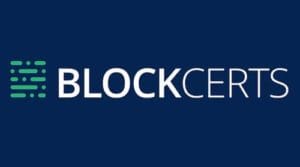 Founded: 2016
Founded: 2016
Location: Cambridge, Massachusetts
Blockcerts is an open standard platform used for creating, issuing, and verifying Blockchain-based certificates. Learning Machine (now a part of Hyland) collaborated with the MIT Media Lab in order to create this platform. It has the capability of creating academic transcripts & credentials records on a Blockchain that helps companies review the documents’ credibility and find the falsified information.
5. APPII
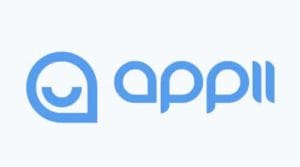 Founded: 2016
Founded: 2016
Location: Fully Remote
APPII combines Machine Learning, smart contracts, and Blockchain technology in education for the academic credentials verification of students & educational professionals. The platform allows users to create a profile and fill out their education history, academic details & transcripts. APPII uses Blockchain development for education for the verification of users’ backgrounds and further stores their information in its Blockchain.
6. Disciplina
 Founded: 2016
Founded: 2016
Location: Fully Remote
The Disciplina platform utilizes the power of Blockchain technology in education to maintain the proper record of a student’s academic achievements and qualifications for universities. The decentralized algorithm of Disciplina assigns a score automatically to students depending on their achievements & qualifications. Universities or educational institutions can use these scores to determine individualized learning plans based on what the student has or hasn’t learned.
7. BEN (Blockchain Education Network)
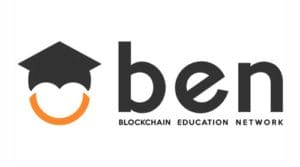 Founded: 2014
Founded: 2014
Location: Fully Remote
The Blockchain Education Network (BEN) comprises a global community of students and alumni who are dedicated to Blockchain and cryptocurrency endeavors. Initially founded by students from MIT and the University of Michigan, BEN serves as a platform for over 6,000 members to collaborate, exchange Blockchain concepts, develop prototypes, and introduce innovative projects.
Key Challenges in Adopting Blockchain Technology in Education
While Blockchain application in education holds great promise for the education sector, its widespread adoption faces certain challenges. Let’s explore some key hurdles that need to be addressed for successful Blockchain development for education:
- Technical Complexity
Blockchain development for education is inherently complex and hence, requires technical expertise for development, implementation, & maintenance. Educational institutions lack the necessary resources and skilled professional assistance to navigate the intricacies of Blockchain technology.
- Scalability
Blockchain networks face scalability issues when it comes to handling a large volume of transactions. In the context of education, where numerous records and credentials need to be stored and verified, scalability becomes a critical concern. To achieve widespread adoption, Blockchain platforms must have the capability to handle the scale and speed required by educational institutions without compromising security or efficiency.
- Interoperability
Educational systems involve multiple stakeholders such as schools, universities, regulatory bodies, & employers. Each entity may have different systems, databases, & standards for storing and sharing information. Achieving interoperability between various Blockchain implementations and traditional systems used in educational institutions can be challenging. The widespread adoption can only be possible if standardized protocols and frameworks are developed for seamless integration between different systems.
- Regulatory and Legal Frameworks
Careful consideration of existing regulatory and legal frameworks is required while Blockchain development for education. Educational institutions must navigate these legal complexities to ensure compliance while leveraging the benefits of Blockchain. Developing clear guidelines and regulations specific to Blockchain in education use cases will boost technology adoption.
- User Experience and Accessibility
The widespread adoption of Blockchain technology in education can be expected if it meets the user experience factors. The user experience needs to be intuitive, seamless, and user-friendly. Designing user interfaces and applications that abstract the complexities of Blockchain while providing transparent access to relevant information is crucial. Additionally, ensuring accessibility for individuals with disabilities and those with limited digital literacy is essential for inclusive adoption.

How can Antier Help EdTech Companies Overcome Major Obstacles?
Addressing the challenges (discussed above) will require a collaborative effort involving educational institutions, policymakers, industry stakeholders, and technology providers like Antier.
Antier is a leading service provider of Blockchain development for education, specializing in creating Blockchain-powered solutions that can benefit learners, institutions, and employers providing maximum transaction transparency, secure learning course access, and easy discovery of falsified information.
We address the technical, regulatory, cultural, and financial aspects and pave the way for the successful development of a Blockchain application in education. We unlock its transformative potential for the benefit of learners, institutions, and employers.
- Antier helps overcome the technical complexity challenge, providing Blockchain specialists support and guidance to education institutions.
- The cost associated with Blockchain development for education can be a significant barrier for resource-constrained education institutions. Our cost-sharing models mitigate the financial burden and make Blockchain more accessible.
- Our developers design a user-friendly interface in order to enhance the user’s Blockchain experience.
- We help the education sector overcome the interoperability challenge by developing standardized protocols and frameworks to ensure seamless integration between different systems.
- Our experts use the power of scalable Blockchain networks that helps record and store a large volume of transactions efficiently.
Antier can be a reliable partner when it comes to empowering the education sector with enhanced efficiency, security and transparency. We have worked with a number of clients in this sector and helped them achieve their goals. Trusting our expertise in this distributed ledger technology for your upcoming educational projects would be an ideal move to streamline your processes, reduce costs, & enhance the quality of education.
Conclusion
In conclusion, Blockchain development has emerged as a powerful tool in revolutionizing the education sector. By enhancing the security, transparency, and efficiency of educational processes, Blockchain technology in education can reshape the way we learn, teach, and verify credentials. From streamlining administrative tasks to enabling lifelong learning and ensuring the authenticity of certificates, Blockchain opens up new possibilities for educational institutions and learners alike. As we continue to explore the vast potential of Blockchain application in education, it is essential to embrace innovation, collaboration, and adaptability to harness the full benefits of this transformative technology. By doing so, we can pave the way for a future where education becomes more accessible, inclusive, and impactful for all.
